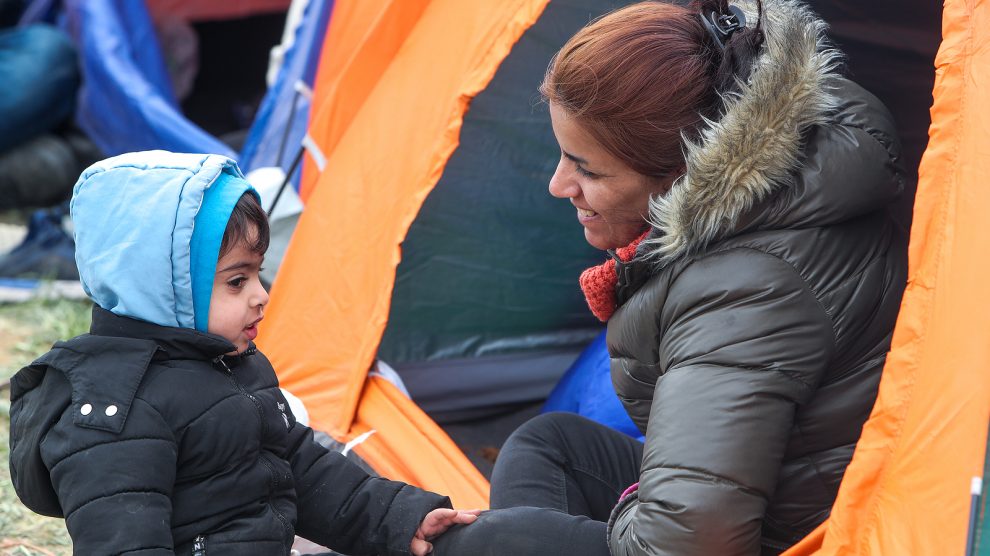Save the Children is the latest human rights group to join calls for concerted action to assist refugees and migrants in the Western Balkans.
Refugees and migrants trapped along the Western Balkans migration route, including some 500 unaccompanied children and 400 children with family who are currently in Bosnia and Herzegovina, are facing increased risks from smugglers, traffickers and border authorities.
Tighter border controls and pushbacks, both at the European Union’s border and between EU countries, have led to an increase in violence and other abuses against children and other vulnerable people, Save the Children has warned.
As EU Commissioner Ylva Johansson visits both Bosnia and Herzegovina and Albania to assess the situation of migrants in the border areas of Croatia and Greece, Save the Children is now calling on the EU to ensure child protection measures are implemented immediately for all migrant children.
- Bosnia and Herzegovina’s entirely predictable refugee crisis
- Bulgaria could be an attractive destination for refugees from the Middle East. Xenophobia means it isn’t
- Bringing technology and transparency to weapons stores in the Western Balkans
The agency wants ongoing reforms of EU migration legislation, especially on the sharing of responsibilities, to address the suffering of children who are in search of safety and, often, reunification with family members already living in Europe.
“Pushbacks of migrants, including unaccompanied minors and families with children, happen not only at the borders of the EU, but also between member states”, says Anita Bay Bundegaard, director of Save the Children Europe.
“It is vital that the EU and its member states put an end to illegal pushbacks and at the same time prioritise child protection at its borders. The EU needs to implement procedures that guarantee a proper age assessment and ensure the protection of children, and it must allow regular, independent monitoring mechanisms for the reporting of incidents that are accessible by children.”
Age assessment procedures lacking
The EU Commisioner is currently visiting Bosnia and Herzegovina, one of the key transit countries on the Balkans migration route. There, hundreds of identified unaccompanied children and children with families are currently sheltered in reception centres, while over 2,300 people, including children, are sleeping rough or in inadequate conditions. According to Save the Children, there may be minors that are not (yet) identified, as proper age assessment procedures are lacking.
“The EU Commission should continue to provide humanitarian support in Bosnia and Herzegovina and demand concrete results from the authorities”, adds Bay Bundegaard. “At the same time, the EU and its members must take concrete steps to provide safe and regular pathways to Europe for refugees and migrants, ensure access to asylum and protection services and share the responsibility for the migration crisis.”
As EU institutions and members are reforming EU legislation on migration, “they need to address the worst and very widespread consequences of the current rules, including bottlenecks at the EU borders”, says Bay Bundegaard.
“This opportunity should not be missed. Improving the legislation on migration can help avoid more children’s suffering and risks of violence, trafficking and exploitation they are currently facing.”
A predictable and avoidable crisis
Save the Children is not the first human rights group to highlight the plight of migrants and refugees in the Western Balkans.
In January, a number of leading human rights organisations, including Amnesty International, Jesuit Refugee Service Europe, Médecins du Monde Belgique and Refugee Rights Europe, called for immediate humanitarian support to address the ongoing migrant emergency in Bosnia and Herzegovina as well the creation of durable institutional solutions to meet the needs of people transiting through the country.
They claim that while the European Union has provided over 88 million euros in assistance to Bosnia and Herzegovina to strengthen its migration management capacity over the past three years, the country has failed to identify suitable facilities for the accommodation of migrants and asylum-seekers, assume full responsibility for the management of existing facilities or to provide minimal guaranteed support to those stranded in the country.
The current humanitarian crisis was predictable – and entirely avoidable. As with every year, the arrival of colder weather provoked stark warnings by humanitarian and human rights organisations that without urgent, additional and suitable facilities, people would face the prospect of spending the winter months without an adequate shelter.
Unlike many news and information platforms, Emerging Europe is free to read, and always will be. There is no paywall here. We are independent, not affiliated with nor representing any political party or business organisation. We want the very best for emerging Europe, nothing more, nothing less. Your support will help us continue to spread the word about this amazing region.
You can contribute here. Thank you.



